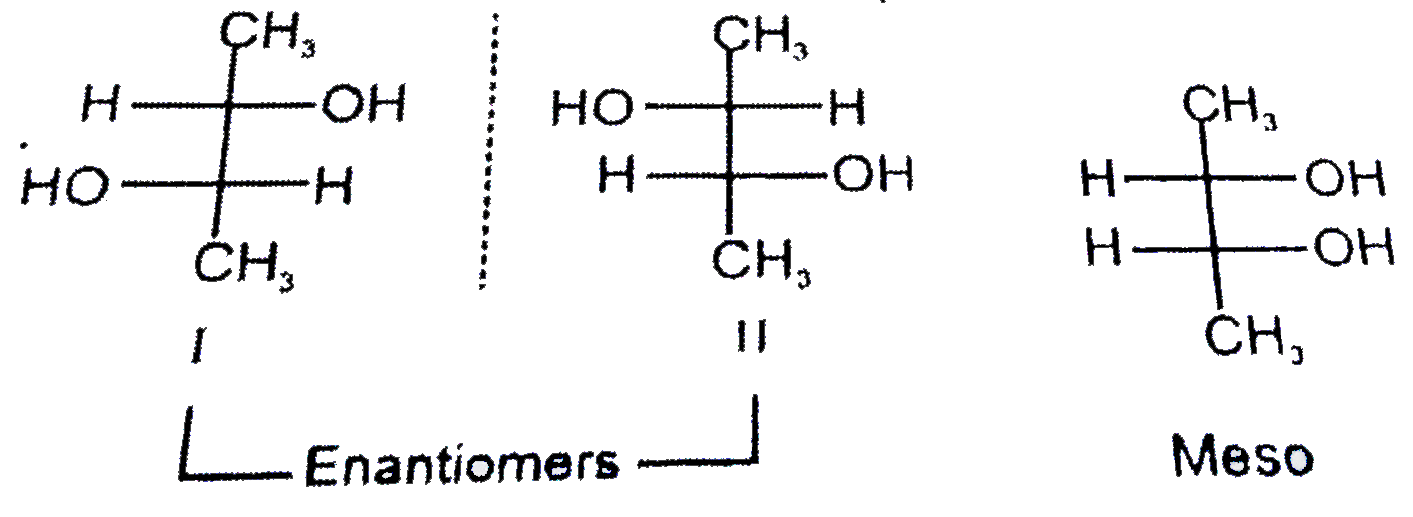Saved Bookmarks
| 1. |
(a) CH_(3)-CH=CH-CH=CH-C_(2)H_(5) (Molecule with dissimilar ends). Here n=2, So Number of G.I = 4 [cis, cis), (trans, trans), (cis, trans,), (trans, cis)] (b) CH_(3)-CH=CH-CH=CH-CH_(3) (Molecule with similar ends) Here n=2, So Number of G.I =3 [(cis, cis), (trans, cis), (cis, trans) = (trans, cis)] (c) CH_(3)-CH=CH-CH=CH-CH=CH-CH_(3) (Molecule with similar ends) Here n=3, So Number of G.I =6 [(cis, cis, trans)= (trans, cis, cis) (cis, trans, trans) = (trans, trans, cis), (cis, cis, cis) (trans, trans, tans), (cis, trans, cis, (trans, cis, trans)] (d) Let us draw the total stereoisomers ofCH_(3)-overset(***)(underset(overset(|)(OH))(CH))-overset(***)(underset(overset(|)(OH))(CH))-overset(***)(underset(overset(|)(OH))(CH))-CH_(3) (e) Let us draw the total stereoisomers of CH_(3)-overset(***)(underset(overset(|)(OH))(CH))-overset(***)(underset(overset(|)(OH))(CH))-CH_(3) (f) Let us draw the total stereoisomers of CH_(3)-CH(OH)-CH_(2)-CH=CH-CI |
|
Answer» Solution :n=3 (odd CHIRAL centers with similar ends.) so, Total STEREOISOMERS `=2^(3-1) = 2^(2) = 4 ("enantlomers " = 2^(n-1) - 2^((n-1)/(2)) " & MESO compounds "=2^((n-1)/(2)))`  So, total isomers `=2^(n-1) + 2^((n)/(2)-1) ("enantiomers "=2^(n-1) " & meso compounds "=2^((n)/(2)-1))`  Total stereo cneters (n) = 1+1 = 2 (Molecule with dissimilar ends) So, total stereoisomers`=2^(2) = 4` [(R, CIS), (R, trans), (S, cis), (S, trans)] |
|
Discussion
No Comment Found
Related InterviewSolutions
- Which of the following compounds is not cleaved by HI even at 525 K ?
- To a 25 mL H_(2)O_(2) solution excess of an acidified solution of potassium iodide was added. The iodine liberated required 20 " mL of " 0.3 N sodium thiosulphate solution Calculate the volume strength of H_(2)O_(2) solution.
- The suggested mechanism of a reaction is : (a) A+BhArrD("fast) "(b)A+Drarr2C("slow")Write the balanced equation of the reaction if its experimentally deduced rate equation is , rate k=[A]^(2)[B] Find the intermediate formed during the course of the reaction . Does the predicted rate law from the mechanism match the experimental rate law ?
- Which of these changes with time for a first-order reaction A Rate of reaction B . Rate constant C . Half-life
- What is the hybridisation of central atom in the product obtained along with hydrofluoric acid when complete hydrolysis of Xenon Hexa Fluoride takes place ?
- Which of the following amino acid forms sulphide bond in polypeptide
- Which of following pair is Diastereomers:
- What is the major product of the following reaction CH_3C-=C-CH_2-CH_3overset("1 mole of " Cl_2)to
- Which polymer is used in petrol tank linings ?
- Which of the following carbohydrates are branched polymer of glucose ?